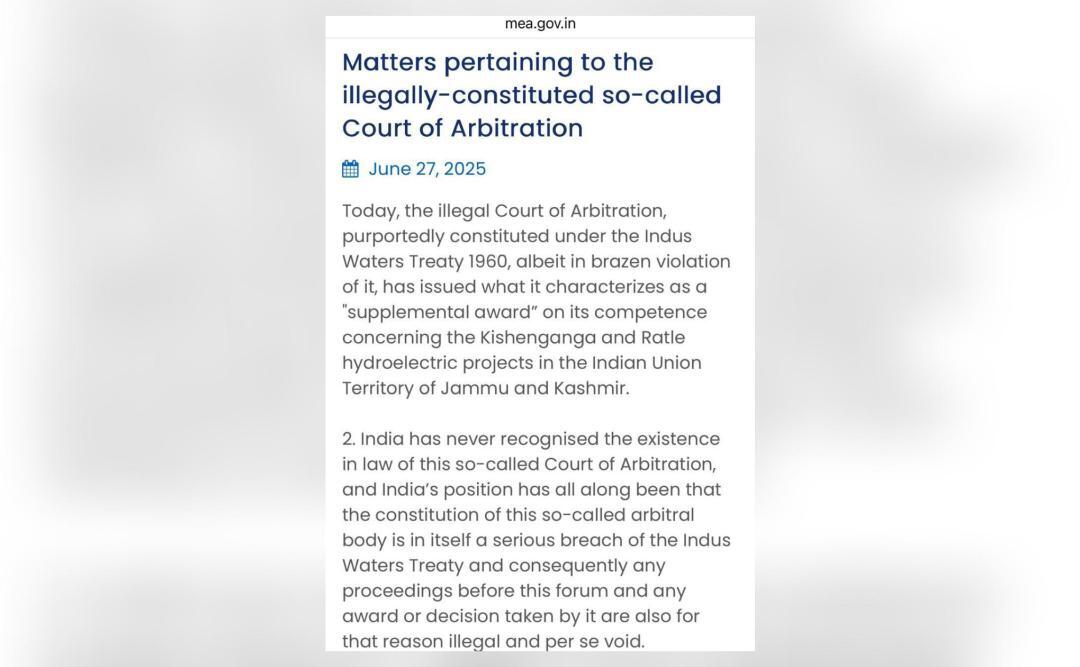
India Rejects Illegal Court of Arbitration’s Ruling After Pak’s Plea on Indus Waters Treaty
The ongoing diplomatic tussle between India and Pakistan has taken another turn with the Indian government rejecting a ruling by an illegal Court of Arbitration on the Indus Waters Treaty. The development comes after Pakistan had approached the court seeking a “supplemental award” on its competence concerning the Kishenganga and Ratle hydroelectric projects in Jammu and Kashmir.
The Indus Waters Treaty was signed in 1960 between India and Pakistan, under which the two countries agreed to share the waters of the Indus River and its tributaries. The treaty was brokered by the World Bank, which played a facilitator’s role in the negotiations. However, over the years, Pakistan has been trying to renegotiate the treaty, claiming that India was violating its terms.
In a latest move, Pakistan approached the Court of Arbitration, which issued a “supplemental award” on its competence concerning the Kishenganga and Ratle hydroelectric projects. However, India has rejected the ruling, terming it as “illegal” and a “desperate attempt” by Pakistan to escape accountability for its role as a global epicentre of terrorism.
The Indian Ministry of External Affairs (MEA) issued a statement rejecting the ruling and slamming Pakistan’s efforts. “This latest charade at Pakistan’s behest is yet another desperate attempt by it to escape accountability for its role as global epicentre of terrorism,” said the MEA spokesperson.
The statement further added that India had consistently maintained that the Indus Waters Treaty was a bilateral agreement between the two countries and that any issues related to the treaty should be resolved through dialogue and negotiations between India and Pakistan.
The MEA also emphasized that India had always been committed to implementing the treaty in a manner that was in line with the principles of equity, fairness, and mutual benefit. “We have also made it clear that any attempt to use coercive or intimidatory tactics, including through the World Bank or any other international organization, will not be acceptable,” said the statement.
India’s rejection of the ruling is seen as a significant development in the ongoing diplomatic standoff between the two countries. Pakistan has been trying to internationalize the issue, but India has consistently maintained that the treaty was a bilateral agreement and that any issues related to it should be resolved through dialogue and negotiations.
The MEA spokesperson also emphasized that India was committed to the principles of the treaty and was willing to engage in dialogue with Pakistan to resolve any outstanding issues. “We are always open to engaging with Pakistan in a constructive and meaningful manner to resolve any outstanding issues related to the Indus Waters Treaty,” said the statement.
The development comes at a time when tensions between India and Pakistan are running high. The two countries have been engaged in a bitter standoff over the past few months, with Pakistan accusing India of violating the ceasefire agreement along the Line of Control (LoC) in Jammu and Kashmir.
India, on the other hand, has been accusing Pakistan of supporting cross-border terrorism and providing safe haven to militant groups operating in the region. The MEA spokesperson also highlighted Pakistan’s role in supporting terrorism, saying that it was a major obstacle to peace and stability in the region.
In conclusion, India’s rejection of the illegal Court of Arbitration’s ruling is a significant development in the ongoing diplomatic standoff between India and Pakistan. The MEA’s statement emphasizes India’s commitment to the principles of the Indus Waters Treaty and its willingness to engage in dialogue with Pakistan to resolve any outstanding issues. However, the development also highlights the complexities of the issue and the need for Pakistan to take concrete steps to address India’s concerns over terrorism and ceasefire violations.






